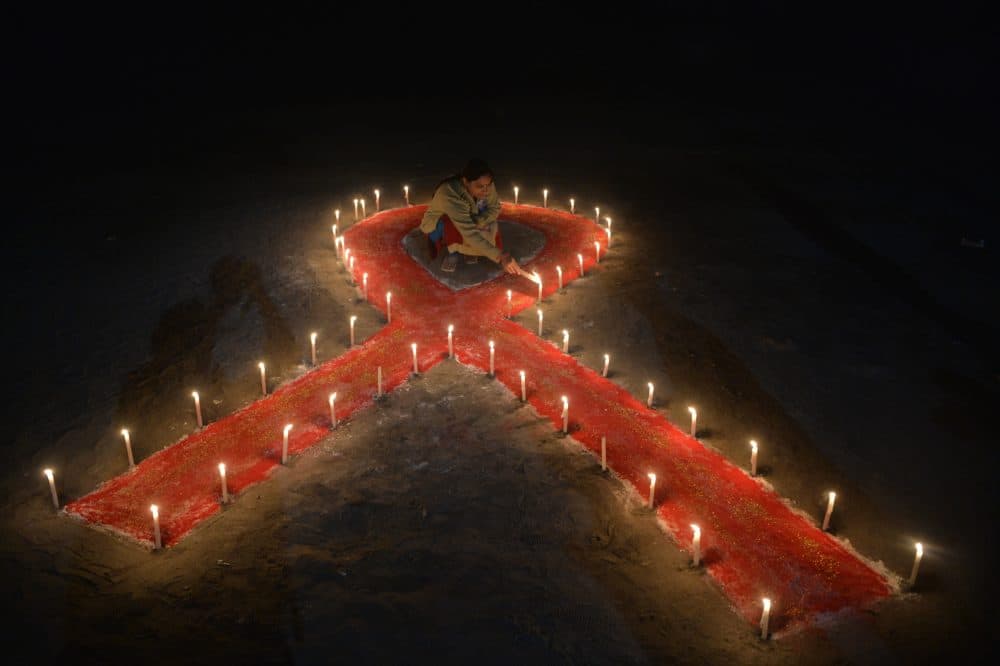Advertisement
AIDS Activist Group Co-Founder Reflects On World AIDS Day, Progress Made Since The 1980s

This World AIDS Day serves as a reminder that COVID-19 is only the latest pandemic.
Nearly 40 years after HIV/AIDS was first detected, more than 30 million people have died worldwide from HIV-related causes. The pandemic was met with silence and inaction when the virus began ripping through the LGBTQ community in the 1980s.
That’s why activists formed ACT UP, the AIDS Coalition to Unleash Power, with a logo containing a single pink triangle and the words, “Silence=Death.”
Avram Finkelstein, an artist and writer based in Brooklyn, New York, who is one of the co-founders of ACT UP, says he sees and feels the parallels between HIV and COVID-19.
“As this is my second pandemic, it's triggering, to say the least,” he says.
The same government agencies — the Centers for Disease Control and Prevention, the National Institutes of Health and the Food and Drug Administration — are at the center of the federal response to COVID-19, Finkelstein says. And Dr. Anthony Fauci, who led early research into HIV, is also at the forefront of the coronavirus pandemic.
“It's almost impossible to avoid the personal implications of hearing these same agencies, these same names occurring now,” he says. “The difference is, of course, the rapidity of and communicability of COVID-19 is so radically different from how HIV/AIDS was communicated, that the whole world is going through this moment together, and that's a very big difference.”
The U.S. government turned a blind eye to HIV in the beginning of the crisis. Former President Ronald Reagan didn’t even mention HIV or AIDS until 1985, four years after the epidemic began.
Finkelstein and six friends formed ACT UP in 1987 after being fed up with years of government inaction to help ease the crisis. Finkelstein says he felt compelled to do something about that lack of awareness after his partner died from the disease in 1984.
Advertisement
“I think history tends to compact events,” Finkelstein says. “So when people think about AIDS activism and ACT UP in particular in 1987, it appears to have been some sort of explosive response, but for those of us on the front lines like myself, AIDS was a slow motion train wreck that began in 1981 and was largely suffered in silence.”
ACT UP went on to become one of the most influential patient advocacy groups in history, leading the charge to create the treatment that keeps millions of HIV positive people alive today.
But nearly 38 million people are still living with HIV across the globe, and Finkelstein stresses the crisis is far from over.
“Part of the question mark about HIV/AIDS, in particular for people in the community, is that it appears to be something that's been eradicated, but in fact, it hasn't,” he says. “The questions of treatment access and stigma and HIV criminalization and the elusive cure are still issues that are very much alive for people who are in the AIDS community.”
The speed at which scientists discovered coronavirus vaccines does give Finkelstein some hope for the future of AIDS research — and finding a cure.
“The technologies and methodologies of research that might actually lead to a potential cure for HIV are rooted right inside of the technologies that have made the COVID-19 vaccine so quick,” he says. “The reason why these vaccines have been brought to the market, as it were, so quickly, is decades of research.”
Cristina Kim produced and edited this interview for broadcast with Tinku Ray and Bruce Gellerman. Samantha Raphelson adapted it for the web.
This segment aired on December 1, 2020.

